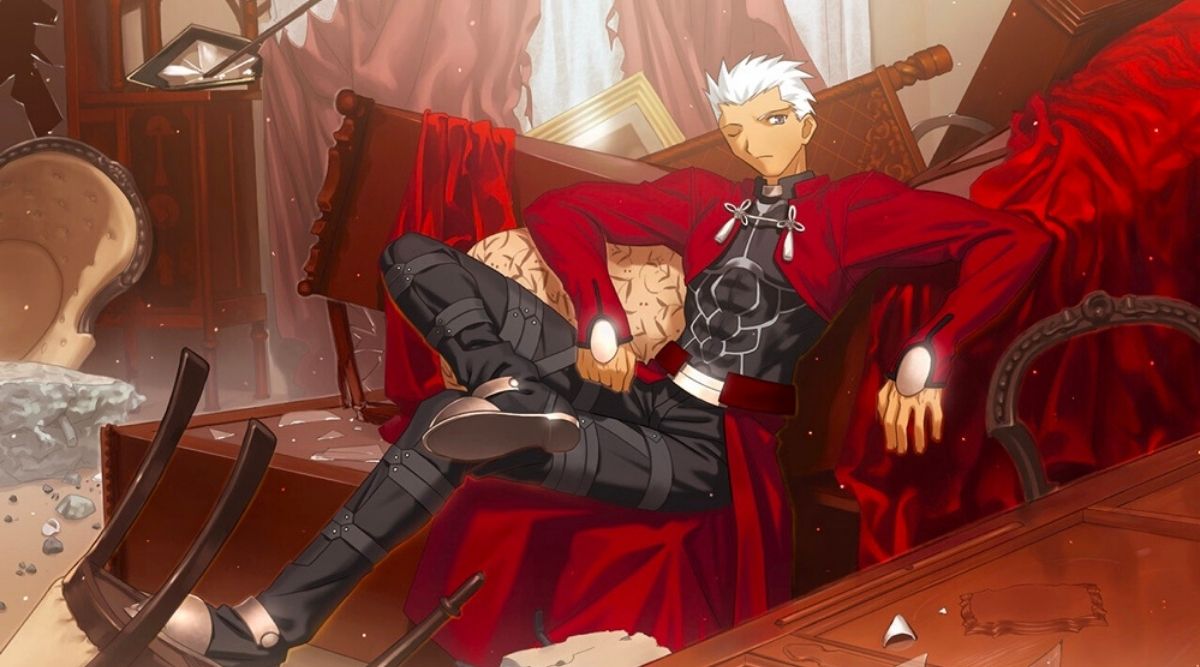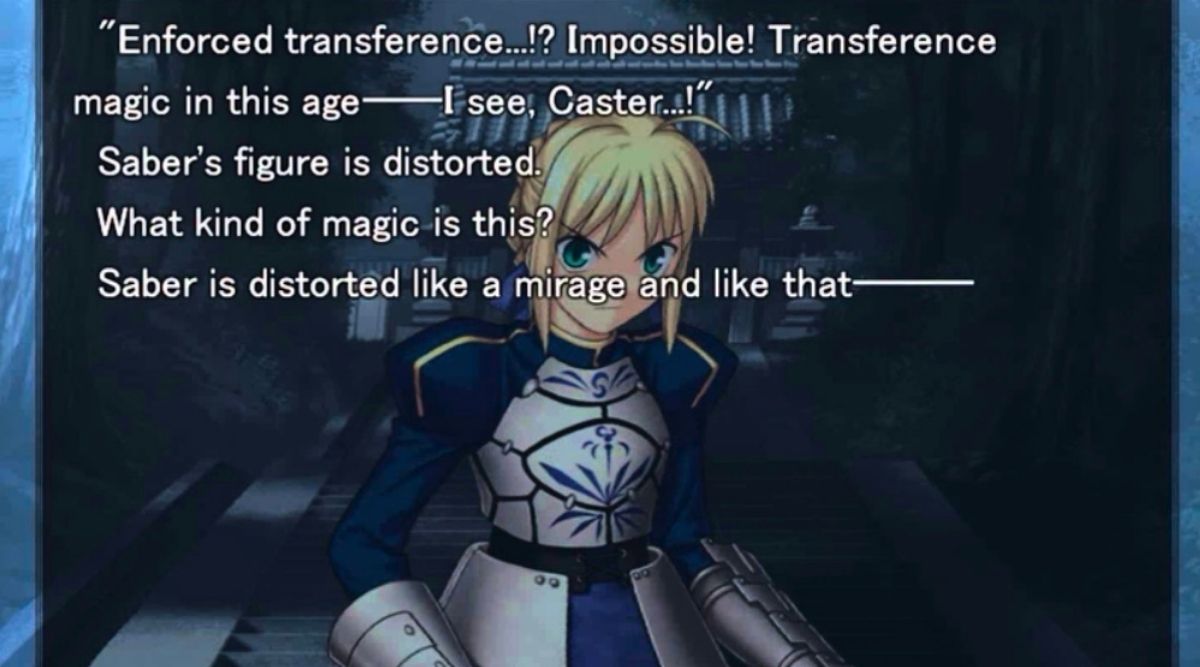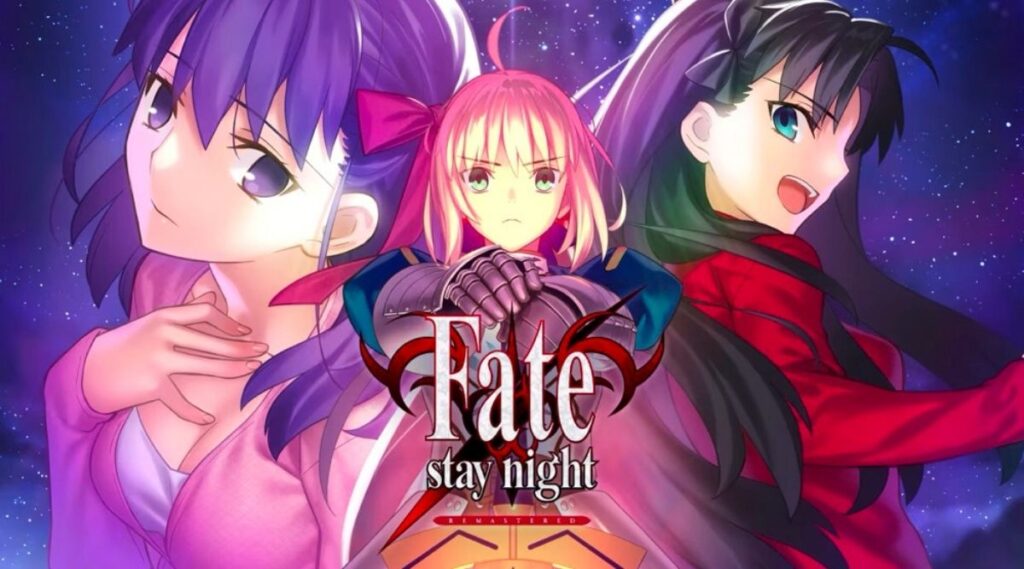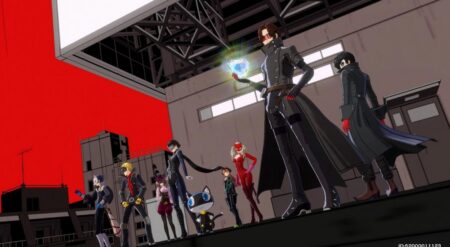As a young man, Shirou Emiya was the sole survivor of a great calamity. Growing up, he dreamed of becoming a Champion of Justice to keep everyone safe and prevent such an event from happening again. His convictions will be tested when he is unwittingly pulled into a contest of magic and might called the Holy Grail War. To the winner, the opportunity to have their greatest wish granted, for the losers, only death is likely. But can someone who wishes to save everyone participate in such a contest? The visual novel Fate/stay night REMASTERED, developed by TYPE-MOON and fuzz Inc. and published by Aniplex Inc. explores that question with mixed results.
It’s easy to get into the weeds when discussing the Fate franchise. Masters bond with servants summoned from throughout time and mythology to fight each other for their greatest wishes. The myriad magical concepts, terms, and ideas the setting creates and expects fans to keep track of can be daunting. Coupled with the philosophical leanings of the series and a robust cast size, you have a recipe for a bloated concept that is likely to drag at many points. Unfortunately, the numerous complexities slowing down Fate/stay night REMASTERED is only one of its major problems.
The first roughly twelve hours of this game come together to form one of the hardest sloughs I’ve ever experienced in media. Despite being a fan of the franchise I can honestly say I wouldn’t have gotten through it if not for my need to write this review. Not only is it slowed by the aforementioned need to lay everything out for the player in terms of the Holy Grail War and magic in general, but it also doubles down on the arduous reading by often repeating information multiple times. This is rapidly tiring.
Also wearing down on the player is Fate/stay night REMASTERED’s reluctance to get the plot moving. After Shirou is pulled into the Holy Grail War, there are several hours where little happens outside of him making meals at home and bickering with his primary companions. While some strong character moments are sprinkled within the drawn-out early chapters of the story, they don’t do nearly enough to salvage the experience.

The final problem we have to talk about is Shirou himself. He is an unlikeable protagonist with huge chauvinism issues. He spends the game’s early chapters insisting girls should never be allowed to face dangerous situations, whether they want to or not. Even his summoned servant, a legendary hero from out of time, struggles with his refusal to let her be who she is. While he eventually moves past much of this, it still creates a huge problem for one specific reason: the medium and genre through which the story is told.
Storytelling in video games is often lauded as a uniquely engaging experience. Due to the player’s role as an active participant instead of a passive observer, the events that fill a narrative can gain a deeper meaning as they feel more like they are happening to us. We don’t just watch tragedies happen to characters but to our companions. This personalizing effect backfires for Fate/stay night REMASTERED.
Whenever Shirou says something demeaning to one of the female characters, it’s infuriating. Not just because it was a crappy thing to say but because “I” was saying it. The game even plays out almost exclusively from Shirou’s point of view, enhancing the feeling that the player is uttering these incredibly outdated ideas.
The only interesting thing about Shirou is how the narrative explores his desire to be a Champion of Justice. His childlike fixation on saving everyone is explored profoundly and intricately throughout the story. Those around him see him push himself far harder than he should, trying to help anyone who asks. While those in his world acknowledge the value of selflessness, it quickly becomes apparent that Shirou crosses lines with how much he lets others ask of him and the danger he puts himself in. The separation between selflessness and low self-worth is explored gradually as the main cast comes to know each other.
While Shirou struggles as a main character, his core supporting cast is far more interesting. His fellow mage, Rin Tohsaka, and his summoned servant Saber both bring inserting, nuanced personalities that only get more intriguing as the story progresses. This is especially true of Rin.

Rin comes across early on as aloof, petty, and often cold-hearted. As the player progresses through Fate/stay night REMASTERED’s story, the game allows the character to be gradually seen in a different light. This unveiling endears the character to players, making them feel like they’ve earned their insights into who Rin truly is as the game’s battles progress.
Players’ choices during critical junctions in each chapter determine which battles and events the player experiences. These choices can even lead to early endings, so players should weigh them carefully. Also, the story has a romance element that the choice system heavily impacts. While the focus isn’t on pursuing a romantic partner, the player’s choices steer Shirou toward one of several options. If you are the kind of player who gets invested in such dynamics, a flow chart is accessible in the pause menu that indicates which choices can impact a character’s feelings.
The final element of this story is the Holy Grail War itself. While it takes a long time for the battles to start in earnest, once they do, Fate/stay night REMASTERED delivers tense, gripping moments of danger and epic conquest. The trials and tribulations of its cast are brought to life through a combination of emotional voice work, epic music, and fantastic still art that gives the battles weight and builds up the suspense in each life-or-death clash.
The one element in these tense moments that will prove problematic for some will be the excessive use of flashing lights during combat. Everything from the clash of swords to magical assaults is paired with flashes of light. If you have concerns about being exposed to such stimuli, I would highly suggest steering clear of this game.
The other major design oversight Fate/stay night REMASTERED suffers from comes with its captions. While full English captions are provided for the Japanese voice work, no consistent indicators exist for who is saying what. Changes in character pose on screen generally cue the player in, but these can be missed, especially when several characters participate in a conversation. If you play games in heavily distracting settings or struggle to differentiate voices, keeping track of who’s saying what could prove challenging.
Fate/stay night REMASTERED delivers fantastic moments, but it’s hardly worth the work to find them. An unlikeable protagonist and overly heavy exposition keep the game from being all it could’ve been. If you have the patience, there is gold to be found, but there are easier ways to enjoy a meaningful story.
Fate/stay night REMASTERED is available now on the Nintendo Switch and Steam.
Fate/stay night REMASTERED
-
Rating - 5/105/10
TL;DR
Fate/stay night REMASTERED delivers fantastic moments, but it’s hardly worth the work to find them.







